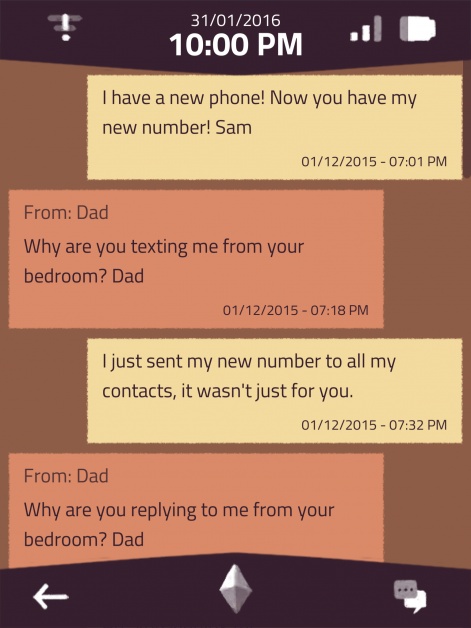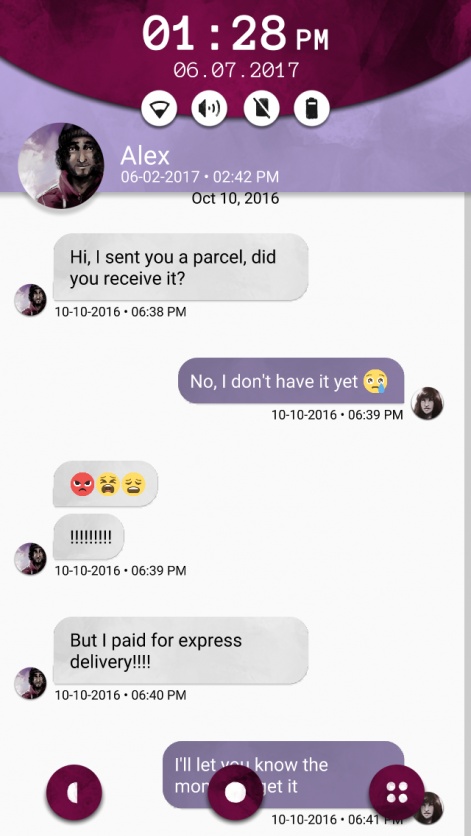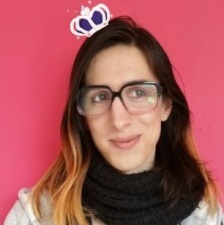With discoverability in the mobile games market becoming harder and harder, we've decided to shine the spotlight on the amazing indie developers making creative new titles.
So welcome to the Indie Spotlight, where each week a developer tells us about their life, work and the challenges they face in the modern mobile market.
This week, we talk to Diane Landais, co-founder of Accidental Queens, the developer behind A Normal Lost Phone and Another Lost Phone: Laura's Story.
PocketGamer.biz: How did you get started as an indie games developer?
Diane Landais: I grew up with a love for video games, computers and tinkering. Tinkering with computers led to learning how to program things - websites first, then eventually small “games”; though I don’t think I could’ve considered anything close to being done at the time…
I got an internship in an indie studio in Paris, basically validating my love for bleeps and flashes over anything else. I tried staying in school but got a job in another studio in the west of France, coding stuff so that creative people around me could make even more bleeps and flashes.
After four years, I left to make my own bleeps and flashes, because I wanted to see more bleeps and flashes of a certain kind, with people who shared that vision.
What drew you to narrative-led games over a more traditional gaming experience?
Watch a movie, read a book, you’re told a story. Then you tell that story. Play a game, you’re living an experience. Then you tell your stories.
Every game is “narrative-led”; the less words there is in a game, the more room there is for you to put your own words there. (Fight me).
What we easily call “narrative-led” games are usually titles that take the best parts of other mediums: the techniques for writing strong characters applied to a text-based game, achievements of photography for a cutscene-heavy game, etcetera… But it makes sense.
What is a typical day in your life as an indie?
My typical day is mostly not what I expected it would be before I actually founded an indie studio with my associates.
The catch lies in three words: running a business. If we exclude Mondays - universal 'worst day' and also the day we dedicate almost entirely to administrative tasks and paperwork - the typical days sometimes include 'making games'.

The rest of the time is dedicated to:
• Thinking about the games we’ve made, thinking about the games we’ll make, putting these thoughts in a typed/written/vocalised format
• Thinking about the games we won’t be able to make, thinking about the game we were trying to make but failed to make, putting these thoughts in a typed/written/vocalised format
• Focusing on things we’d rather not focus on, that have nothing to do with games but require our attention so that everyone in and around that company can safely keep thinking about games.
When there’s really nothing else, then it’s a 'making games' moment, and those are the best. It’s just weird, because the hardest thing in all of this is not making games, it’s creating the environment that will enable us - and whoever makes games with us - to actually make games.
I believe 'success' starts at the very moment we can sustainably start thinking about 'personal accomplishment' in our work.Diane Landais
Finding the opportunity to “become indie again for a short while” is not an indie job at all. It’s worth it though.
What have been the biggest challenges you’ve faced so far as an indie?
In no particular order:
Functioning as a human being amongst other human beings. That’s hard in any situation, but after a great deal of personal sacrifices, and a long piling up of production mistakes, when the stakes are at their highest before releasing a game and there’s no turning back, it hits hard.
I would include “ending toxic relationships”, “actively maintaining healthy relationships”, and “two-way communication of feelings” in that spot. I’ve failed at all of these at some point since we’ve created Accidental Queens, and I expect to fail again a lot.
The French administration and paperwork.
Giving credit where it’s due/taking credit when it’s needed. I don’t believe we’ve thanked the people who helped us during the creation of our two previous games, often or loudly enough.
But I also have a hard time believing that we’ve turned all that help into something worthwhile for everyone. That’s a moral challenge, finding that balance and feeling comfortable with it.
Working with the Unity UI system.
Staying physically healthy. Eating well, sleeping enough, exercising, toning down the addictions… the usual 'silent killers'.
How do you define 'success'?
I believe success starts at the very moment we can sustainably start thinking about personal accomplishment in our work, because everything that comes before is safely taken care of.
Some questions are to be asked daily: “Will I be able to eat today?”, “Are we fulfilling the needs of the people who depend on this company?”, and “Do I treat the team, our partners, our players, and myself decently and with respect?”.
It’s hard to think about personal accomplishment when any of the previous questions are still hanging.
Reaching that privilege is my definition of success. Whether you fulfil your needs because a hit was released and cashed in millions, or because it was a passion project done on the evenings after a day job, it doesn’t really matter. By that definition, it’s a success.
'Success' is also having a set of values that makes the previous definition of success a positive one.
What is your opinion of the mobile games market for indies right now?
I believe the mobile games market has had an untapped potential since the first iPhone came around. Since day one, releasing an app on a mobile store was pretty much inaccessible to anyone who didn’t have a company, money and some technical knowledge. Not impossible mind you, but not particularly easy.
The mobile games ecosystem is as good as it has been since 2007. The mobile games market is as bad as it has been since 2007.Diane Landais
The Android ecosystem made that slightly easier. Newer games engines also helped. Web technologies evolved too, and since smartphones give us a semi-permanent access to a web-browser and internet connection it’s now easier to make a game that works in a smartphone browser than it is to make a game that natively runs on a smartphone.
But making a game that reaches a huge amount of people still largely includes dealing with the mobile stores, crowded marketplaces that are either too strict on their guidelines, or not strict enough and flooded with clones or malware.
The mobile games ecosystem is as good as it has been since 2007. It even got better since the devices evolved and have become more powerful and packed with high-tech features.
The mobile games market is as bad as it has been since 2007. It gets even worse as irresponsible metrics-centred behaviour start to become the norm.
In that sense, the mobile games market has had an untapped potential since day one, because it had to compete, and quickly lose, against the bigger, scarier, mobile market as a whole; and it’s never going back.
Could you tell us about your most recent game?
Our latest game is called Another Lost Phone: Laura’s Story. It’s a narrative-heavy investigation game, that takes place inside of a fake smartphone interface.

You’ve found a lost phone and you can try to figure out what happened to its owner by digging through the messages, galleries and other apps on the phone.
It was released in September 2017 and is available on iOS and Android, as well as Windows, Mac and Linux through Steam and other stores, for around €3.
It’s the spiritual sequel to “A Normal Lost Phone”, our previous game, released in January 2017.
Exploring new forms of storytelling through video games was our starting point and it’s an endless journey.Diane Landais
Both games attempt to tackle socially impactful subjects, through the lens of their phone-based interface and storyline.
The disappearance of the owner of the phone is the explicit goal of the game, but ultimately both experiences are about these serious topics: coming of age, LGBT-phobia and gender identity for A Normal Lost Phone; and psychological violence, harassment and work/life balance for Another Lost Phone.
What are your current plans for the future?
With our previous games, we’ve set some stepping stones for the future of Accidental Queens. Exploring new forms of storytelling through video games was our starting point and it’s an endless journey.
Using video games as a means to deliver a message and share our values is another big part of our studio’s identity.
Lost phones aren’t, though, and we intend to move away from that specific format. There are other interfaces that are not usually used as storytelling devices which bring their own constraints and possibilities, and we’re currently headed this way.
We are working on a project, but it’s far too early to say anything more than that: it’s an Accidental Queens project. The team changed and grew slightly, and our new teammates have brought skills and experiences that drive the studio even closer to what it aspires to be.
On top of that we’re trying our best to encourage other creators to, a) realise the power they wield when making video games and the responsibilities it comes with; and b) use that power for good.
What advice would you give to other developers on “making it” as an indie?
- Don’t neglect or treat yourself badly.
- Don’t neglect or treat the people close to you any worse than you treat yourself. If there’s no one close to you right now, I’d suggest trying to fix that first.
- If you’re all geared up, with things to say, means to say it, people to help you make that possible, and enough stability to let go of some of the things that keep you 100 per cent safe, you’re ready to make the leap.
- Seriously, take care of yourself.
- Seriously, take care of others.
- From now on, anytime you’re making games and still following the definition of 'success' I gave earlier, in my opinion, you’re 'making it'.






















